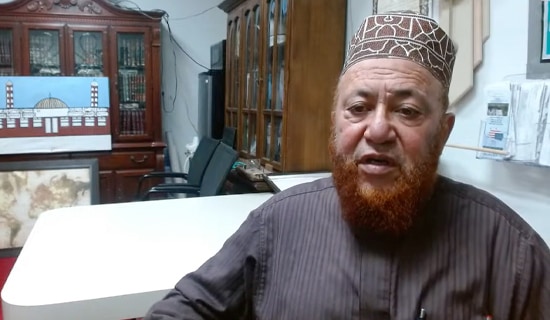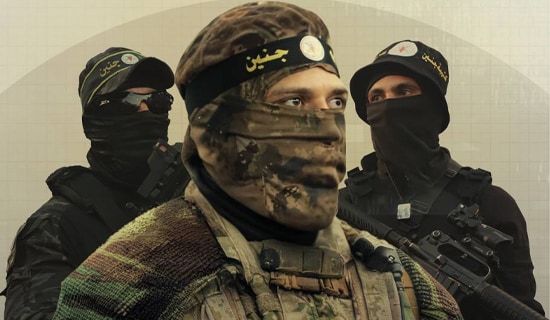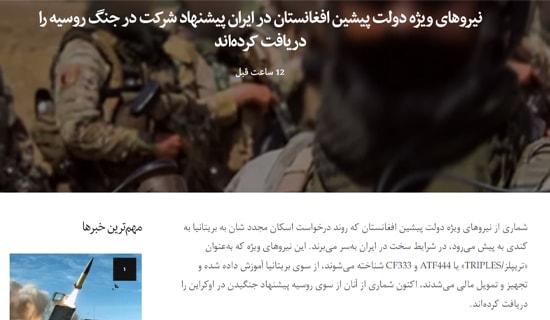Shi'ite Lebanese cleric Muhammad Ali Al-Husseini, who heads the Arab Islamic Council in Lebanon and is known for his opposition to Hizbullah, told the Iraqi daily Al-Zaman on March 10, 2015 that Iran is striving to take over Arab countries and destabilize them by recruiting local elements. He warned that Iran would continue to eat away at the Arab countries unless the Arabs unite and oppose it. He said that Iran, with the Americans' blessing, has become the patron of Yemen, Lebanon, Syria, and Iraq, and that the imminent U.S.-Iran nuclear deal will be at the expense of Arab countries.
Al-Husseini also argued that extremism in the Sunni world was a response to Iran's and Hizbullah's Shi'ite extremism, and that Iran was a source of global terrorism; he added that it is escalating Hizbullah-Israel tensions so that it can both raise oil prices to ease its economic distress and speed up the nuclear negotiations.
The following are excerpts from the interview:

Muhammad Ali Al-Husseini (image: Al-Zaman, Iraq, March 10, 2015)
Iran Is Behind Hizbullah's Escalation Of Its Activity Against Israel
"Q: Recently, we have witnessed the expansion of Hizbullah, Iran's prot├®g├®, in Syria and Iraq. Is this part of an Iranian plan to establish a regional empire?"
"A: The plan of Iran's rule of the jurisprudent to expand to our Arab countries is nothing new. It originates with [Ayatollah Ruhollah] Khomeini's takeover of the Iranian regime and the so-called plan to export the [Islamic] Revolution to the world. This is under the banner of supporting the weak and defending Palestine, and on the false claim that the rule of the jurisprudent is the mother of mercy for oppressed Shi'ites in their countries, as well as the haven for Sunnis who are persecuted in their homelands. I can mention, for example, the naming of a street in Tehran after [Egyptian president Anwar Sadat's assassin] Khalid Al-Islambouli; [Iran's] support for Sunni Islamists in Algeria and Egypt, and allowing Al-Qaeda leaders and bin Laden's family into Tehran after they fled Afghanistan.
"Using this stratagem, the Iranian regime has managed to infiltrate Iraq, Syria, Lebanon, Yemen, Bahrain, Saudi Arabia, Kuwait, and other lands, in order to realize its ambitious plan to take over our Arab countries. This followed its recruitment of [local] agents in these countries to actualize its grand political plan - that is, to eat away at Lebanon, Syria, Iraq and Yemen.
"The [Iranian] regime will continue doing this unless we stand up to it and oppose it. This is the responsibility of us all...ÔÇØ
"Q: What are the causes of the recent escalation between Hizbullah and Israel?
"A: Everyone knows that before [Israel] withdrew from South Lebanon [in 2000], it had an understanding with Hizbullah... which was violated in the June 2006 war and was subsequently changed. In this context, at the start of the Syrian crisis and Hizbullah's direct involvement in it, which made Israel touchy, fundamental principles were set, with two clauses: no weapons transfers from Syria to Hizbullah in Lebanon, and no Hizbullah presence near the [Israeli] border.
"When the [first] clause was violated, Israel bombed weapons deliveries [to Hizbullah via Syria], and when the second clause was violated and Hizbullah approached the border near Quneitra, it bombed them [too]. Things then escalated following Hizbullah's retaliation, which came from South Lebanon as opposed to Quneitra, and matters ended at that.
"This was the visible part of the escalation, but the secret part, and the truth, is that [Iran's] rule of the jurisprudent suffers from two things: difficulties in the nuclear [negotiations], and increasing economic pressure due to the drop in oil prices. In my opinion, the second problem is more significant, since it has damaged [Iran's] economic depth and threatens the Iranian regime from within. In light of this, ending this crisis involves reviving the Israeli front, [which] necessarily raises oil prices [and also] speeds up the nuclear negotiations in favor of the [Iranian] regime - that is, two birds with one stone...
"However, the results on the ground after Israel bombed the convoy of IRGC and Hizbullah commanders were not what [Iran and Hizbullah] had thought they would be. Additionally, they received a stern message that any further escalation would trigger a direct Israeli incursion into Damascus."
"Q: In light of the possibility that Hizbullah would involve Lebanon in a war against Israel, which would threaten [Lebanon's] security as well as the security of the region, what can Lebanese political forces do to oppose this Hizbullah plans that could harm Lebanon?
"A: We in Lebanon object to decisions of war and peace being in the hands of any group or party, specifically Hizbullah, whose decisions and actions are dictated by Iran's rule of the jurisprudent. We have repeatedly demanded that [such] decisions of war and peace be placed exclusively in the hands of the Lebanese state. However, Hizbullah's control of Lebanon, as well as its tyranny against the Lebanese state and people aided by Iranian funds and weapons, have eliminated our ability, and the ability of UNIFIL forces in South Lebanon, to deter it from military action."
In Order To Deal With Terrorist Organizations We Must Cut Off The Serpent's Head - That Is, The Rule Of The Jurisprudent
"Q: Do you believe that extremist organizations entered Lebanon in response to Hizbullah's involvement in the Syrian crisis?
"A: Yes, definitely. Hizbullah, and its backer, the Iranian rule of the jurisprudent, are directly responsible for the spread of violence and extremism, not just in Lebanon but also in Iraq, Syria and Yemen. This is because extremism and violence beget extremism and violence. Hizbullah is now reaping [the fruits] of the extremist groups that it sowed, raised, nurtured, and even trained in Lebanon, Iraq and Yemen. This is exactly what the rule of the jurisprudent wants; it cannot live in our Arab countries other than by creating crises in them..."
"Q: In your opinion, what are the reasons for increasing tension among different schools and sects in the Arab world in recent years?
"A: I do not deny that there are ancient ideological and religious differences between schools and sects. But in themselves, they are not enough to cause extremism, accusations of apostasy, and sharp divides. Therefore, unfortunately, I believe that what is happening today in the Arab world is nothing but an artificial clamour with political purpose. Clamour that ostensibly [seems] religious, but is actually political... Politics tarnishes everything it touches. That is why I think the supreme Islamic interest is to reactivate Al-Azhar's initiative to bring schools of thought closer together..."
"Q: In your opinion, what are the reasons for the spread of extremist organizations such as ISIS in recent years, and how can we deal with this phenomenon?
"A: There are several reasons. The main reason is Iran's rule of the jurisprudent, which lies in wait for the security of us Arabs, creating fitna and inciting violence... [This regime] is the source of global terrorism, and works day and night to establish extremist jihad groups and movements that serve its interests and prepare the ground for its plan.
"The Iranian regime cannot interfere in any Arab country so long as [the Arab country] is steadfast and stable. Just as a microbe cannot live in a sterile environment, and instead thrives in filth, Iran's rule of the jurisprudent is attempting to attract [jihadi] groups, whether Sunni, Shi'ite, Arab or foreign. It supports them, helps them, and generously provides them with everything they need, and later uses them as a means to achieve its ends...
"In my opinion, in order to deal with these groups we must cut off the serpent's head - that is, the rule of the jurisprudent - as opposed to its tail. This is because if we do not cut off its head, it will remain alive, and continue to pose the same danger by giving rise to more terrorism.
"The best defense is a good offense, and therefore we must coordinate and cooperate on this matter with the National Council of Resistance of Iran,[1] since it is the element... that is capable of cutting off the head of the fitna, and knows better than anyone how to do so. We cannot coexist with the rule of the jurisprudent in any way..."
"Q: Do you think that the increasing U.S.-Iran closeness on the nuclear issue could come at the expense of the Arab region?
"A: Yes, of course. Ever since the Iranian regime usurped the Iranian people's [1979] revolution, it has raised the banner of the slogan of the U.S. as the Great Satan. Furthermore, it has executed Iranians on charges of contacts or ties with it. Yet suddenly we see it sitting beside the American administration, tossing aside its false morals.
"The Iranian regime is cheating. It is trying to actualize its dangerous political plan at any cost. It is prepared to scheme against the Arabs not only together with the U.S., but together with Israel as well, and it has done this before.
"[Iran's] entry into Afghanistan was with the cooperation and coordination of the U.S., as was its entry into Iraq... Now, we see [the U.S. and Iran] becoming closer, on the pretext of combatting terrorism. Iran has seized Lebanon and has become its patron with the consent of the Americans; the same is true for Syria and Iraq. The Iranians are in Sana'a with America's blessing, and the rule of the jurisprudent is going to continue infiltrating, and eating away at, our Arab countries - unless we unite and stand against it.
"This is what we are doing in the Arab Islamic Council. We are exposing the plots of the rule of the jurisprudent, thwarting its plans, and resisting them ideologically and politically. We are prepared, and we are reaching out to everyone to coordinate and cooperate in order to preserve pan-Arab security..."
[1] An umbrella organization of five Iranian opposition political organizations, the largest of which is Mojahedin-e-Khalq.





